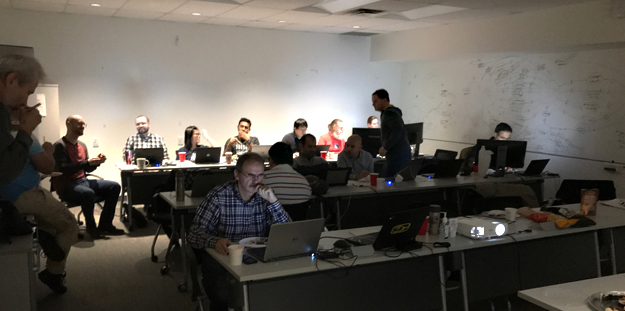After three years of intense preparation, the success of the Platform Modernization Project came down to one weekend. Led by Next Generation Student Information Services (NGSIS), the project involved converting over 2 million lines of code and replacing an aging server. The new platform will modernize U of T’s student information system for years to come.
From November 16 to 19, teams from Enterprise Applications & Solutions Integration (EASI), Enterprise Infrastructure Solutions (EIS), and Information Security worked around the clock to ensure a smooth cutover to the new system.
The support team attends a pre-cutover planning meeting (photo by Sarosh Jamal)
“A project with a ‘hard’ cutover – meaning all-or-nothing – requires a talented and motivated cross-functional team,” says Frank Boshoff, senior manager, technical solutions and architecture with Enterprise Applications and Solutions Integration (EASI). “The results speak for themselves. In a single weekend, ROSI changed from being a legacy mainframe application with roots in the mid-1970’s, to an Internet-savvy application with some modern smarts.”
In the future, 15,000 students will be able to use the system via ACORN simultaneously, versus the current 700. The new platform will also open up the potential for live integration with divisional systems, and ensure U of T stays at the forefront of technological innovation.
How did the team pull off such a large-scale project?
“A project of this size requires many talented resources, not only from EASI, but also from across Information Technology Services departments, and support from our user community has been phenomenal,” says Cathy Eberts, executive director of EASI. “Many of our divisional colleagues participated in the user acceptance testing and in implementing a number of new products.”
The core team celebrates after the successful cutover (photo by Sarosh Jamal)
The next phase of the project will involve developing the Data Decision Support System, which will be a near real-time copy of the ROSI data. It will allow staff to perform operational and analytical reports more quickly during peak registration periods. ACORN will also perform faster for students as they no longer need to compete with administrative staff for processing power.
“Now we can begin to integrate ROSI with other systems, within ITS and the divisions, to better meet academic and administrative needs,” says Boshoff. “The Data Decision Support System is part of this process, offering improved security and helping staff to work more efficiently. We’re excited for the future!”
Thank you to all of our user acceptance testers, divisional users and the main project team who helped make this project a success.
Project team:
| Hossein Aliabadi | Gerry Lindo |
| Dharmesh Amalsadia | Paul Littlefield |
| Diana Augustin | Robert Liu |
| Diana Avon | David Lock |
| Katie Babcock | Mezba Mahtab |
| John Bassani | Sinisa Markovic |
| Joe Bate | Sue Mcglashan |
| Christine Beckermann | Philip Millenaar |
| Donald Boere | Evan Moir |
| Brenda Boshoff | Wei-hua (Walter)Ni |
| Frank Boshoff | Michael O’Cleirigh |
| Rod Branch | Jose Parada |
| Cidalia Carreiro | Andrey Pletnev |
| Kun Chai | Dana Pogaceanu |
| Kim Chan | Haroon Rafique |
| June Cheng | Ted Sikorski |
| Magdelene Cheung | Pete St Onge |
| Richard Chow | Petru Sugar |
| Hung Chu | Joanne Sukhai |
| Alex Dault | Alex Tchakhamakhtchian |
| Paul Day | Blair Thompson |
| Cris Diaconu | Ken Tsang |
| Miki Harmath | Luzinda Van Huyssteen |
| Matthew Hendrickson | Parani Vinayagamoorthy |
| Titus Hsu | Amanda Werkhaizer |
| Sarosh Jamal | Gaye Wignall |
| Kelly Jay | Laurel Williams |
| Sydney Jia | Zoe Wong |
| Andre Kalamandeen | Mike Wyers |
| Laura Klamot | David Yin |
| Anton Kruger | Bruce Zhu |
| Nicky Lai | |
|
|

